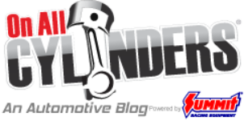Mailbag: X303 or E303 — Considering Valve Clearance When Selecting a Ford Cam
Q: I have a 1989 5.0L Mustang, and I recently purchased a Ford Performance X303-grind cam for it. I have some questions concerning valve clearance. Can I run stock pistons with this cam, or will it be necessary to alter the piston to achieve the proper piston valve clearance. How much clearance is recommended with this cam?
Monday Mailbag: The Mystery of the 4,000 RPM Power Drop-Off
Q: I have a 1988 Chevy 350, bored .060-inch over. It has TRW forged flat top pistons, 230-degree duration (at .050-inch lift)/.560-inch lift COMP Cams roller cam run straight up, and iron heads with 64cc chambers, 2.02/1.60-inch valves, and ported intake runners. The intake is an Edelbrock Torker II with a Performer 750 cfm vacuum secondary carburetor.
Ask Away! with Jeff Smith: What You Need to Know About Ethanol, Fuel Blends & Your Fuel Line
I’m hearing all kinds of things about ethanol in fuel that will destroy a normal rubber fuel line. Should I change the fuel line in my car? I’ve heard that ethanol will even eat the steel fuel line. Is that true? What kind of fuel line should I use? B.E. Jeff Smith: Let’s start with
Mailbag: Tracking Down the Source of Engine Knock
Q: I built a 350 engine using parts from Summit Racing. At about 3,000 miles the engine would make a clacking noise at startup, but only when the engine hadn’t been run in a while. When the oil pressure came up (60-70 pounds), the noise stopped in a second or two. At about 3,500-3,800 miles, I
Mailbag: Intro to Fuel Flow Ratings, Fuel Pressure & Fuel System Basics
Q: I have a street/strip 1969 Camaro with a 427 big block that puts out about 475 horsepower at 6,000 rpm. The engine has an 800 cfm Holley fed by a factory mechanical fuel pump running fuel through a 3/8-inch fuel line. I have seen quite a few mechanical and electric fuel pumps that are rated
Mailbag: What Causes My Engine to Shake After Cold Startup?
Q: I have a couple of problems I hope you can help me solve. I have a 1969 383 Mopar that shakes right after the first cold startup, but only if it’s been longer than 24 hours since the engine was last running. I was told this might be because the electric choke on my Edelbrock
Ask Away! with Jeff Smith: A Quick Guide to Engine Bearings
I am about to rebuild my first small block Chevy and I’ve been looking at parts and prices and noticed something. The bearing companies list several part numbers for things like main bearings for my 350 Chevy. The prices seem to vary quite a bit – much more than I expected. I’m going to assume
Mailbag: Choosing Fuel Lines for a Street Rod Build
Q: I’m getting ready to plumb my ’33 Ford with new fuel lines. What type of line should I be using? A: It’s no secret, the formulation of pump gas has changed dramatically over the years. Your next fill up is likely to contain a blend of gasoline and ethyl alcohol (ethanol), plus an ever-changing recipe of
Mailbag: Using Rail vs. Non-Rail Rockers on Early Small Fords
Q: I have a question about a 1966 Mustang with a 289 V8. I have rebuilt the engine and replaced the stock heads with a set of 1968 302 heads rebuilt by a local machine shop. I replaced the cam with one whose specs match the ones recommended by Edelbrock for use with its Performer
Ask Away! with Jeff Smith: Facts and Myths About Coolants and Coolant Additives
Now that the temperature is heating up and my engine seems to be running hotter, I’m reading all kinds of stuff on the internet about different coolants. I’ve also seen claims about additives you can just pour in and the engine will run cooler. Do any of these work? D.P. Jeff Smith: Over the years,




Stay Connected